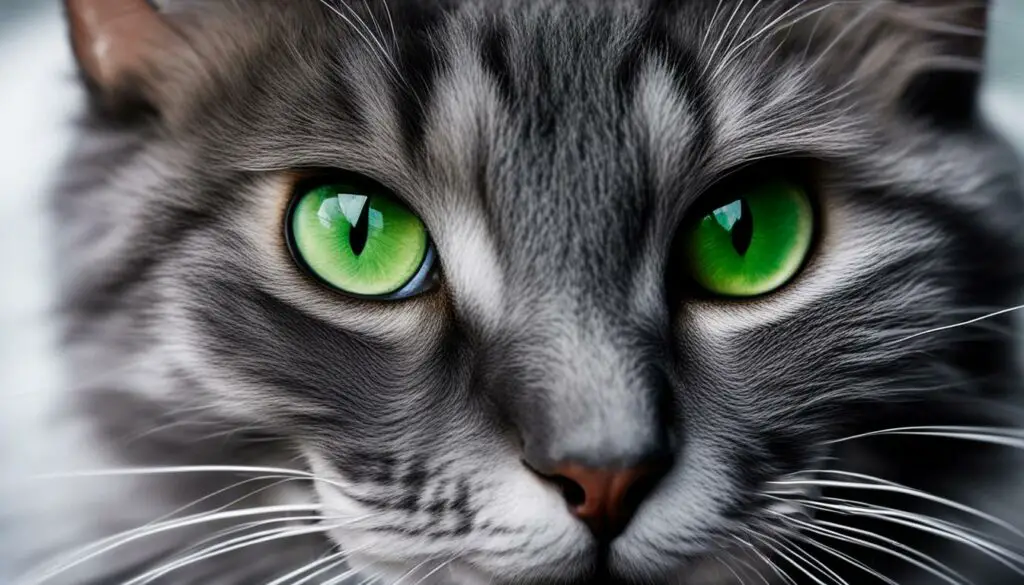Bringing home a new cat can be an exciting and rewarding experience. However, it can also come with its challenges, especially if your new feline friend won’t stop meowing. Understanding why cats meow and addressing their needs is essential in helping them adjust and find comfort in their new home.
When cats meow, they are attempting to communicate with humans and express their desires. It can be their way of letting you know that they are hungry, in need of attention, or simply trying to get your attention. By understanding the reasons behind your cat’s meowing, you can better respond to their needs and provide the necessary care.
In this article, we will explore the various reasons behind your newly adopted cat’s excessive meowing and how you can address this behavior. Whether it’s hunger, stress, seeking attention, or other factors, we will provide practical solutions to help your furry friend feel calm and content in their new environment.
Key Takeaways:
- Excessive meowing in newly adopted cats is a common behavior that can be addressed with understanding and patience.
- Cats meow to communicate their needs, such as hunger, attention, or stress.
- Identifying the underlying cause of your cat’s meowing is crucial in finding the appropriate solution.
- Providing a supportive and enriching environment can help reduce excessive meowing.
- If excessive meowing persists or is accompanied by other concerning symptoms, it’s recommended to seek veterinary advice.
Why Do Cats Meow?
Cats are known for their vocalization, and meowing is one of their primary forms of communication. They use meows to express various needs and desires, ranging from hunger and attention to mating and social interaction. Meowing has evolved as a way for cats to get humans’ attention and elicit a response. It is important to understand the reasons behind your cat’s meowing in order to provide them with the appropriate care and attention.
Cats also use body language to communicate, but meowing is their primary vocalization method when interacting with humans. It is a way for them to express their needs and express their desire for certain things, such as food or playtime. Meowing can vary in tone, volume, and frequency, depending on the cat’s personality and the situation at hand.
While meowing is a natural behavior for cats, excessive or persistent meowing may indicate an underlying issue that needs to be addressed. Understanding the different reasons behind your cat’s meowing can help you determine if they are just seeking attention or if there is a deeper issue that needs to be addressed.
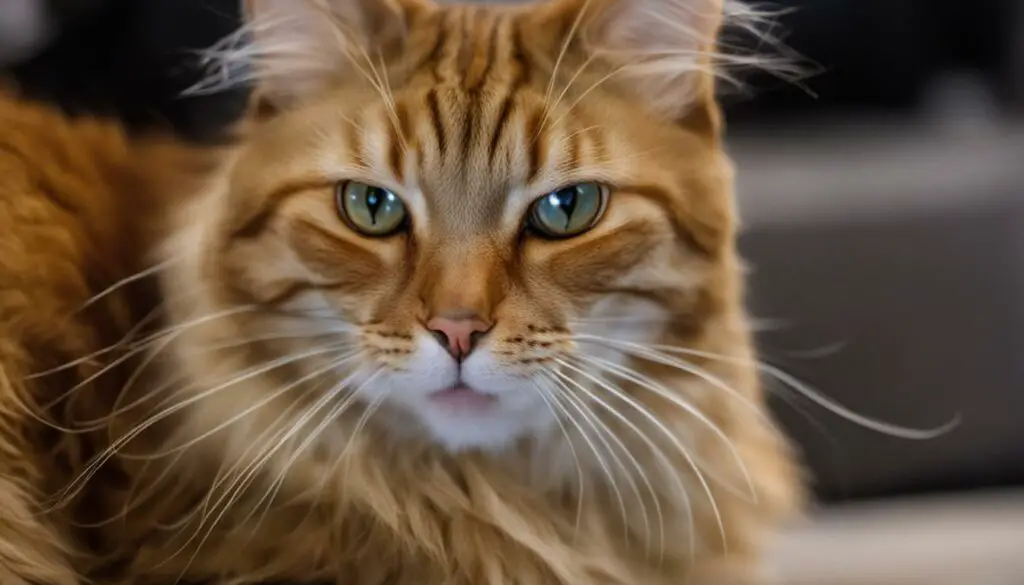
Why Do Cats Meow?
There are several reasons why cats meow:
- Hunger: Cats may meow to let you know they are hungry and want to be fed.
- Attention: Cats may meow to get your attention and seek interaction or playtime.
- Stress or anxiety: Cats may meow excessively when they are feeling stressed or anxious, especially in unfamiliar or tense situations.
- Medical issues: Excessive meowing can also be a sign of underlying health problems, such as pain or discomfort.
By understanding the reasons behind your cat’s meowing, you can better respond to their needs and provide them with the care and attention they require.
Table: Reasons Why Cats Meow
| Reason | Description |
|---|---|
| Hunger | Cats may meow to express hunger and request food. |
| Attention | Cats may meow to seek attention and interaction with their owners. |
| Stress or Anxiety | Cats may meow excessively when feeling stressed or anxious. |
| Medical Issues | Excessive meowing can be a sign of underlying health problems. |
Reasons Behind Excessive Meowing
Excessive meowing in cats can be caused by various reasons. One common reason is hunger or thirst. If a cat’s needs for food or water go unmet, they may continue to meow until their needs are addressed. To ensure your cat is well-fed and hydrated, make sure to provide regular meals and fresh water throughout the day.
Cats may also meow excessively if they are scared, anxious, or stressed. Cats are sensitive creatures and can be easily affected by changes in their environment or routine. Major life events such as moving to a new home or the introduction of a new family member can trigger anxiety in cats, leading to excessive meowing. Providing a calm and secure environment, along with plenty of hiding spots and comforting items like blankets or toys, can help reduce their stress levels.
“Understanding and addressing the underlying cause of your cat’s excessive meowing is crucial in helping them feel more at ease.
In some cases, excessive meowing can be a sign of a medical issue. Cats may meow more than usual if they are in pain or discomfort. If you notice any changes in your cat’s behavior or suspect they may be in pain, it’s important to consult with a veterinarian. A thorough examination can help identify and address any potential health issues, providing your cat with the necessary care and treatment.
| Possible Reasons for Excessive Meowing: | How to Address |
|---|---|
| Hunger or thirst | Ensure regular meals and fresh water are provided |
| Scared, anxious, or stressed | Create a calm and secure environment, offer hiding spots and comforting items |
| Medical issues | Consult with a veterinarian for a thorough examination and appropriate treatment |
Understanding and addressing the underlying cause of your cat’s excessive meowing is crucial in helping them feel more at ease. By providing them with the necessary care, attention, and a stress-free environment, you can help reduce their meowing and promote their overall well-being.
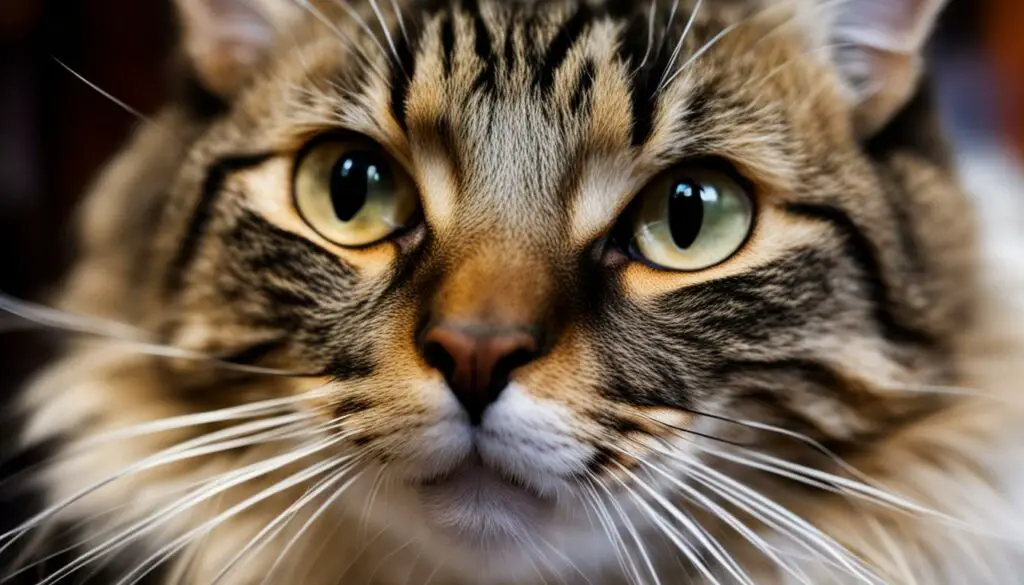
Meowing in Kittens
Kittens may meow excessively when they are separated from their mother and littermates. The bond between a mother and her kittens is strong, and being separated can cause distress for the kittens. If you have recently adopted a young kitten, their constant meowing may be a sign of their distress and longing for their mother. Providing them with comfort and reassurance can help them feel more secure in their new environment.
Kittens rely on their mother for warmth, nourishment, and social interaction. When they are separated, they may feel anxious and lonely, leading to excessive meowing. It’s important to understand that this behavior is normal and a natural part of their development. As they adjust to their new home and bond with their new family, their meowing should decrease over time.
To help ease the transition for your kitten, create a safe and comfortable space for them. Provide them with a cozy bed, toys to play with, and a litter box in a quiet area of your home. Spend quality time with them, offering gentle petting and play sessions to help build trust and create a sense of security. If you notice persistent distress or excessive meowing that doesn’t improve over time, it’s advisable to consult a veterinarian for further guidance.
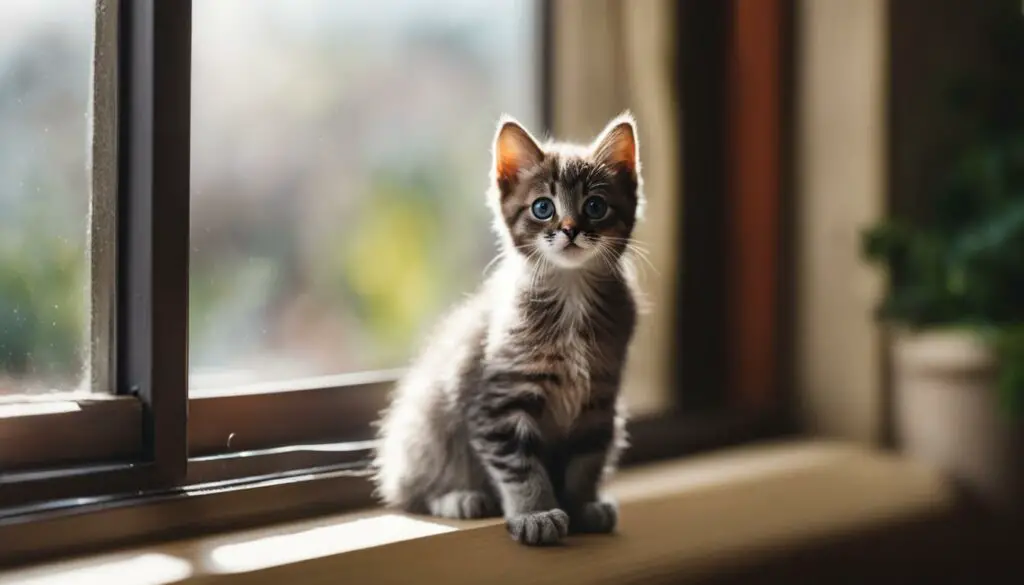
Table: Tips for Comforting a Meowing Kitten
| Tip | Description |
|---|---|
| Provide a warm and cozy space | Set up a comfortable bed or blanket for your kitten to snuggle in. |
| Offer gentle petting and cuddling | Stroke your kitten’s fur softly to provide comfort and reassurance. |
| Engage in playtime | Provide interactive toys to keep your kitten engaged and distracted from meowing. |
| Mimic mother’s presence | Offer a stuffed toy or a ticking clock wrapped in a blanket to simulate the warmth and heartbeat of the mother. |
| Stick to a routine | Establish a consistent schedule for feeding, playtime, and rest to create a sense of security for your kitten. |
Seeking Attention and Comfort
When cats meow excessively, it can often be a sign that they are seeking attention or comfort from their owners. Cats are naturally social creatures and enjoy being around people they trust. Ignoring a cat’s constant meowing is not recommended, as it may deprive them of the reassurance they seek. Instead, it’s important to spend quality time with your cat and provide affection to help reduce their excessive meowing.
One way to show attention and comfort to your cat is by engaging in interactive play sessions. Cats love to chase and pounce, so providing them with toys that simulate their natural hunting instincts can be a great way to keep them entertained and give them the attention they crave. This can help redirect their energy and reduce excessive meowing.
In addition to playtime, creating a calm and inviting environment for your cat can also help reduce their meowing. Cats are sensitive to their surroundings, so ensuring they have a comfortable space of their own with cozy bedding, scratching posts, and hiding spots can help them feel secure. It’s also important to maintain a consistent routine and provide them with regular meals and affection.
Providing Comfort and Reducing Meowing: Tips and Tricks
- Set aside regular playtime with interactive toys to keep your cat engaged and mentally stimulated.
- Provide a calm and comforting environment with cozy bedding and hiding spots.
- Maintain a consistent routine with regular meals and affection.
- Respond to your cat’s meowing with gentle attention and reassurance.
- Avoid ignoring their meowing completely, as they may be seeking comfort or attention.
“Cats are naturally social creatures and enjoy being around people they trust.”
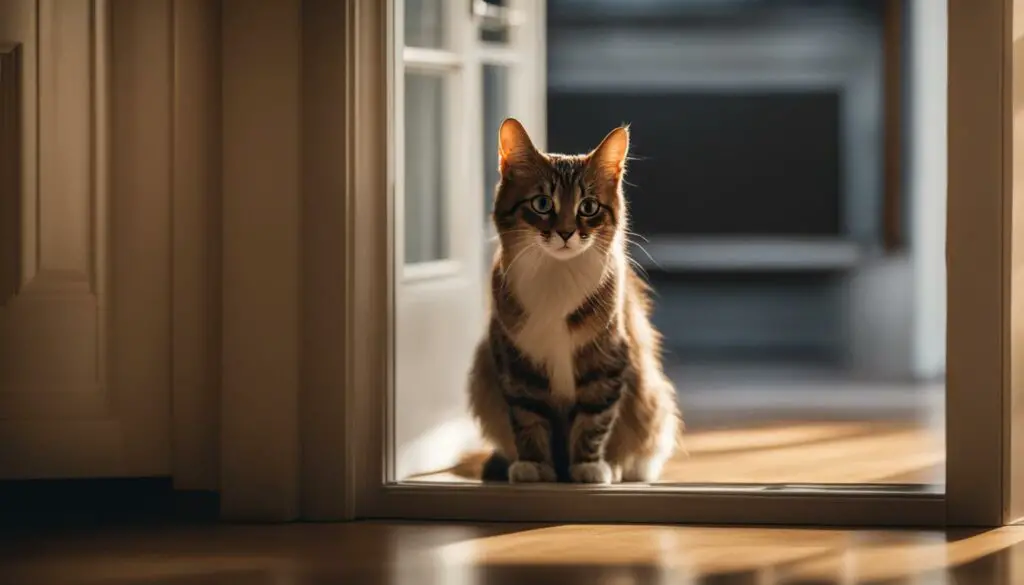
By understanding your cat’s need for attention and comfort, you can help reduce their excessive meowing and create a stronger bond with them. Remember, cats rely on vocalizations to communicate, so providing the reassurance they seek is essential in keeping them calm and content.
Medical Reasons for Excessive Meowing
Excessive meowing in cats can sometimes be attributed to medical issues, causing them pain or distress. It’s important to be vigilant and monitor your cat’s behavior for any signs of discomfort or unusual behavior. If you notice persistent meowing accompanied by other worrying symptoms, it’s recommended to consult with a veterinarian for a proper diagnosis and suitable treatment.
Some of the medical conditions that may contribute to excessive meowing include urinary tract infections, dental problems, gastrointestinal issues, and hyperthyroidism. These conditions can cause discomfort or pain, leading to increased vocalization in cats. Treatment options may include medication, dietary changes, or surgical intervention, depending on the underlying issue.
Regular veterinary check-ups are crucial in maintaining your cat’s overall health and well-being. Routine examinations can help detect any underlying medical conditions early on, allowing for prompt intervention to alleviate their discomfort and reduce excessive meowing. Your veterinarian can provide guidance specific to your cat’s needs and recommend appropriate preventive measures to ensure their ongoing good health.
| Medical Conditions | Signs and Symptoms |
|---|---|
| Urinary Tract Infections | Frequent urination, blood in the urine, straining in the litter box |
| Dental Problems | Difficulty eating, drooling, bad breath, swollen gums |
| Gastrointestinal Issues | Vomiting, diarrhea, constipation, loss of appetite |
| Hyperthyroidism | Weight loss, increased appetite, restlessness, rapid heartbeat |
Remember, understanding the underlying cause of your cat’s excessive meowing is essential in providing them with the necessary care and comfort. By addressing any medical issues and ensuring regular veterinary check-ups, you can help alleviate their pain and distress, leading to a happier and quieter feline companion.
Playing and Predatory Behavior
Playing is an important part of a cat’s natural behavior, and meowing during playtime is quite common. Cats often use meows as a means of communication, expressing their excitement and engagement during play. It’s their way of channeling their predatory instincts and interacting with their environment.
During play sessions, cats may exhibit behaviors such as pouncing, stalking, and chasing. These actions mimic their hunting instincts, allowing them to practice their coordination and agility. Meowing can be a way for cats to signal their playfulness and invitation to engage with their owners.
To encourage healthy play and reduce excessive meowing, it’s important to provide your cat with plenty of interactive toys. Toys that simulate prey, such as feather wands or laser pointers, can keep your cat engaged and mentally stimulated. Additionally, providing scratching posts and climbing structures can help satisfy their natural need for exercise and exploration.
| Benefits of Play and Predatory Behavior | How to Encourage Play |
|---|---|
|
|
Remember, it’s important to match your cat’s play style and preferences. Some cats may prefer chasing toys, while others may enjoy batting at objects. Observe your cat’s behavior and adapt playtime accordingly.
Engaging in regular play sessions not only helps reduce excessive meowing but also strengthens the bond between you and your furry friend. It provides them with an outlet for their energy, allowing them to release any pent-up tension or frustration. So, grab a toy and join in on the fun!
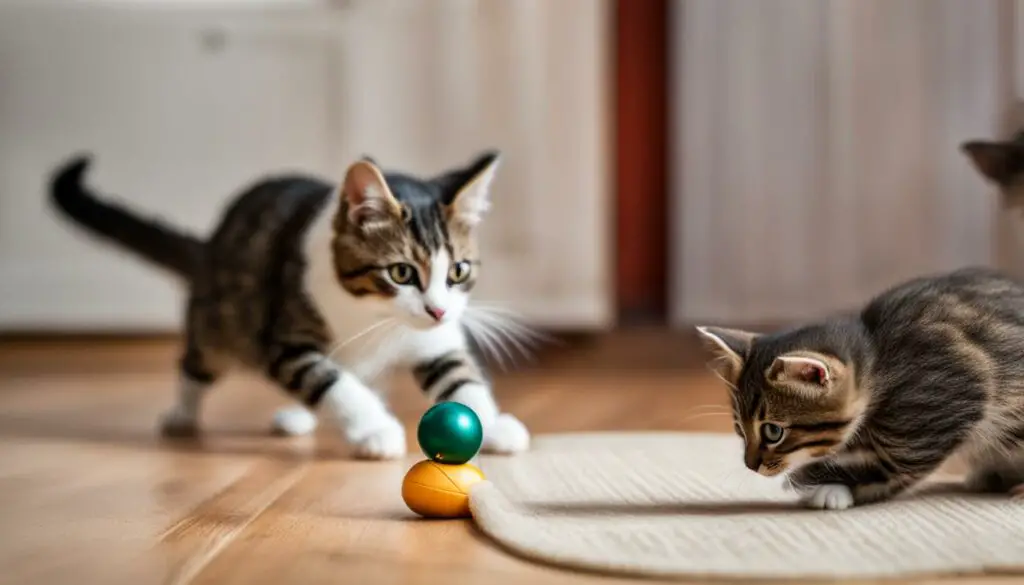
References:
- Smith, A. C., & Litchfield, C. (2010). A review of the relationship between welfare indicators and environmental enrichment: A focus on cats. Applied Animal Behaviour Science, 128(1-4), 1-19.
- Ellis, S. L., Rodan, I., Carney, H. C., Heath, S., Rochlitz, I., Shearburn, L. D., … & Westropp, J. L. (2013). AAFP and ISFM feline environmental needs guidelines. Journal of Feline Medicine and Surgery, 15(3), 219-230.
Adjusting to a New Home
Bringing a cat into a new home can be an exciting and rewarding experience. However, it is important to understand that your new feline friend may need some time to adjust to their new surroundings. During this adjustment period, your cat may exhibit excessive meowing as they navigate their unfamiliar environment.
It is normal for cats to feel overwhelmed and anxious when they are introduced to a new home. The unfamiliar sights, sounds, and smells can be stressful for them. As a result, they may vocalize their discomfort through excessive meowing.
To help your cat feel more at ease and reduce their meowing, there are several things you can do. First, provide them with a quiet and designated space where they can retreat to when they feel overwhelmed. This safe space should include all of their essential needs, such as a litter box, food and water bowls, and a comfortable resting area. Additionally, slowly introduce them to the different rooms in your home, allowing them to explore at their own pace.
Keeping your cat’s routine consistent can also help ease their transition. Cats are creatures of habit, and maintaining a familiar schedule for feeding, playtime, and quiet time can help them adjust more quickly. Additionally, providing plenty of mental and physical stimulation through interactive toys and play sessions can help alleviate their anxiety and redirect their excess energy.
Remember, every cat is unique and may require different levels of time and patience to adjust to their new home. If your cat’s excessive meowing persists beyond the initial adjustment period, it may be helpful to consult with a veterinarian or a professional animal behaviorist for further guidance.

Table: Tips for Helping Your Cat Adjust to a New Home
| Tip | Description |
|---|---|
| Create a safe space | Set up a quiet area with all their essentials where they can retreat to when feeling overwhelmed. |
| Introduce rooms slowly | Allow your cat to explore different rooms at their own pace, gradually introducing them to the entire home. |
| Maintain a consistent routine | Stick to a familiar schedule for feeding, playtime, and quiet time to provide a sense of stability. |
| Provide mental and physical stimulation | Engage your cat with interactive toys and play sessions to alleviate anxiety and redirect their energy. |
| Seek professional help if needed | If excessive meowing persists, consult with a veterinarian or animal behaviorist for further guidance. |
Environmental Factors and Stress
Environmental factors can play a significant role in a cat’s meowing behavior. Changes in their surroundings, such as loud noises or unfamiliar visitors, can cause stress and anxiety, leading to excessive meowing. Creating a calm and stress-free environment for your cat is essential in reducing their meowing. It’s important to identify and address potential stress triggers to help your cat feel more comfortable and secure in their surroundings.
One way to reduce environmental stress is by providing a designated safe space for your cat. This can be a cozy corner in a quiet room or a cat tree where they can retreat and feel secure. Additionally, consider using pheromone diffusers or calming sprays specifically designed for cats to help create a calming atmosphere. These products can mimic the natural pheromones that cats release when they feel content and safe, helping to reduce their stress levels.
Another important environmental factor to consider is your cat’s access to essential resources. Make sure they have a comfortable and clean litter box that is easily accessible, as well as fresh food and water in a quiet location. Providing plenty of toys, scratching posts, and interactive playtime can also help keep your cat mentally and physically stimulated, reducing their overall stress levels and excessive meowing.
Creating a Stress-Free Environment Tips:
- Designate a quiet and cozy space for your cat where they can feel safe and secure.
- Use pheromone diffusers or calming sprays to create a calming atmosphere.
- Ensure your cat has access to essential resources such as a clean litter box, fresh food, and water.
- Provide plenty of toys, scratching posts, and interactive playtime to keep them mentally and physically stimulated.
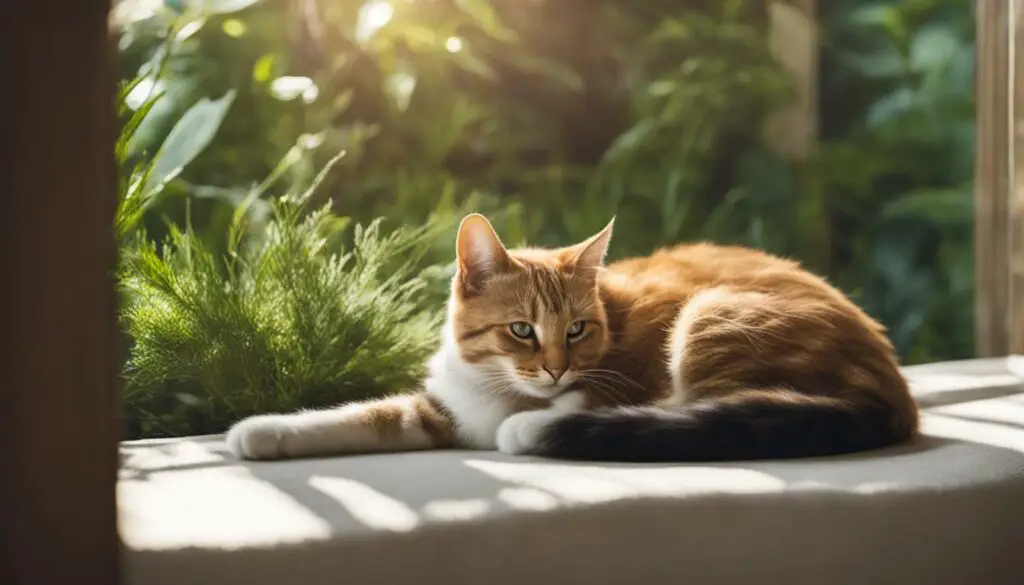
By addressing environmental factors and reducing stress, you can help alleviate your cat’s excessive meowing. Creating a calm and comfortable environment will not only benefit your cat’s overall well-being but also strengthen the bond between you and your feline friend. Remember to observe and address any changes in their behavior to ensure their happiness and reduce their meowing.
Cognitive Issues and Excessive Meowing
Cats with cognitive issues may exhibit excessive meowing as a result of confusion and boredom. Just like humans, cats can experience cognitive decline as they age, leading to changes in behavior and cognitive functions. These issues can manifest in various ways, including disorientation, forgetfulness, and difficulty recognizing familiar faces or objects.
When cats are confused or bored, they may meow excessively as a way to seek stimulation and attention. They may also meow out of habit, as their cognitive decline can affect their ability to communicate effectively. It’s important to be patient and understanding with cats experiencing cognitive issues, providing them with a comforting and enriching environment.
One way to alleviate the effects of cognitive issues is to engage cats in mental and physical stimulation. Interactive toys, puzzle feeders, and scratching posts can help keep their minds active and provide a sense of purpose. Creating a structured routine and maintaining a familiar environment can also help reduce confusion and provide comfort to cats with cognitive issues.
| Signs of Cognitive Issues in Cats | Ways to Address Cognitive Issues |
|---|---|
|
|
If you suspect that your cat is experiencing cognitive issues, it’s important to consult a veterinarian for a professional diagnosis. They can evaluate your cat’s behavior and provide guidance on how to manage their symptoms. While cognitive issues cannot be completely reversed, with proper care and attention, you can help enhance your cat’s quality of life and minimize the impact of excessive meowing caused by confusion and boredom.
Meowing and Reproductive Behaviors
When it comes to meowing in cats, reproductive behaviors can play a significant role. Unspayed female cats may meow excessively when they are in heat, as this is their way of attracting potential mates. They may vocalize more frequently and loudly to signal their availability. On the other hand, unneutered male cats may also meow when they detect the scent of a female cat in heat, indicating their desire to mate.
Spaying and neutering your cat can help alleviate these reproductive-related behaviors and reduce their excessive meowing. Spaying your female cat eliminates her heat cycles, reducing the need for her to vocalize to attract mates. Neutering your male cat eliminates his urge to mate and reduces the likelihood of him meowing when detecting the scent of a female in heat. Additionally, spaying and neutering have numerous health benefits for cats and can help prevent unwanted litters.
It’s essential to discuss the spaying and neutering process with your veterinarian, who can provide guidance on the best timing and approach for your cat. By addressing your cat’s reproductive behaviors through spaying or neutering, you can help reduce their excessive meowing and contribute to their overall well-being.
Benefits of Spaying and Neutering Cats
Spaying and neutering your cat not only helps reduce their reproductive behaviors but also provides several health and behavioral benefits. Here are some key advantages:
- Prevents the risk of certain reproductive cancers
- Eliminates the risk of uterine infections in female cats
- Reduces roaming and the likelihood of your cat getting lost or injured
- Helps prevent aggressive behaviors in male cats
- Reduces spraying and marking behaviors in both male and female cats
Consulting with your veterinarian can help you make an informed decision about spaying or neutering your cat and the appropriate timing for the procedure.
| Reproductive Behaviors | Spaying | Neutering |
|---|---|---|
| Excessive meowing during heat cycles | Reduces or eliminates | N/A |
| Aggressive behavior in male cats | N/A | Reduces or eliminates |
| Roaming and risk of getting lost or injured | Reduces | Reduces |
| Risk of reproductive cancers | Reduces | N/A |
| Risk of uterine infections in female cats | Eliminates | N/A |
| Spraying and marking behaviors | Reduces or eliminates | Reduces or eliminates |
Spaying and neutering your cat is an important step in responsible pet ownership. By addressing their reproductive behaviors through these procedures, you can help reduce excessive meowing, prevent unwanted litters, and promote their overall health and well-being.
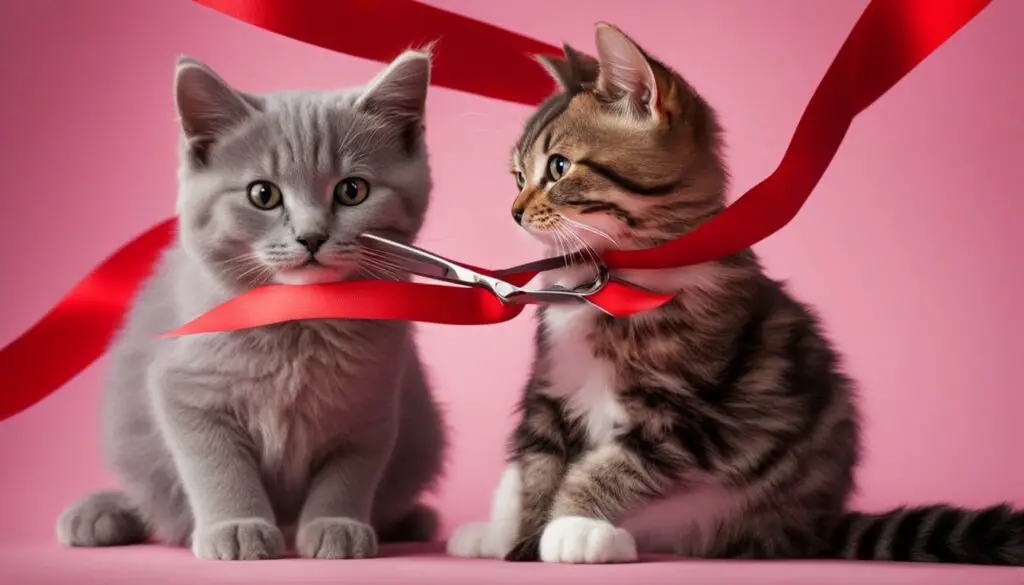
Giving Attention and Avoiding Reinforcement
When your cat meows excessively, it’s important to provide the right kind of attention while avoiding unintentional reinforcement of the behavior. Ignoring constant meowing during inappropriate times, such as in the middle of the night, can help discourage the behavior. Instead of rewarding unwanted meowing, it’s essential to reinforce your cat’s quiet behavior.
One way to provide attention without reinforcing excessive meowing is to establish a consistent routine of quality time and play sessions with your cat. Engaging in interactive play can help redirect their energy and provide the mental and physical stimulation they need. It also strengthens the bond between you and your furry companion.
Another effective strategy to avoid reinforcement is to use positive reinforcement techniques. Reward your cat with treats, praise, or gentle strokes when they are quiet and calm. This helps create a positive association with being quiet and encourages the desired behavior. Consistency is key when using positive reinforcement, as it helps your cat understand the link between their behavior and the rewards they receive.
| Attention and Reinforcement Tips |
|---|
| Ignore constant meowing during inappropriate times, such as in the middle of the night. |
| Establish a consistent routine of quality time and interactive play sessions. |
| Use positive reinforcement techniques to reward quiet and calm behavior. |
Remember, every cat is unique, and what works for one may not work for another. It’s important to observe and understand your cat’s behavior to determine the most appropriate approach. By giving attention and avoiding unintended reinforcement, you can help your cat develop healthy communication habits and reduce excessive meowing.
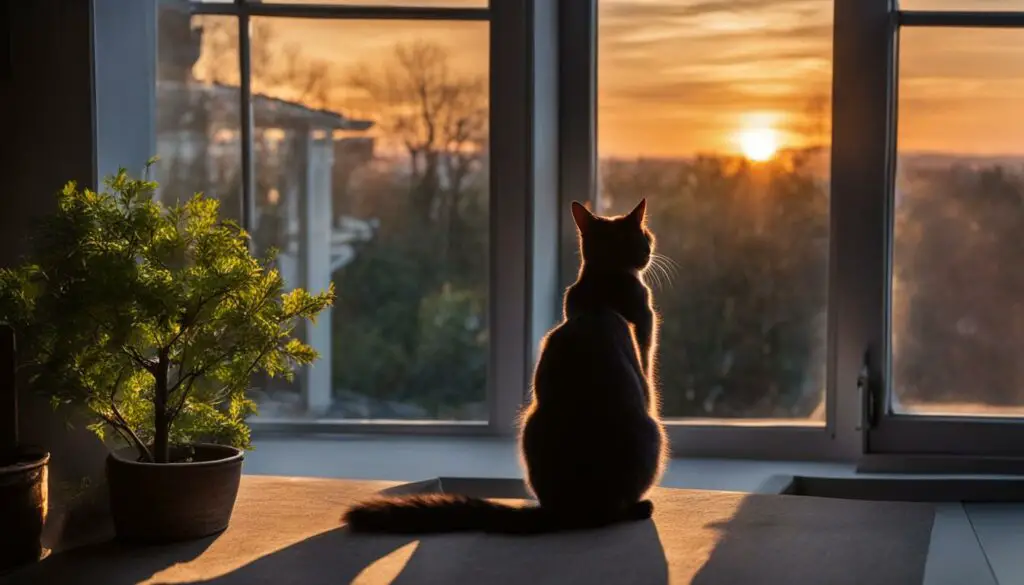
Providing Mental and Physical Stimulation
As a responsible cat owner, it’s essential to provide your feline friend with adequate mental and physical stimulation to keep them happy and healthy. Just like humans, cats can experience boredom, which can lead to excessive meowing. By engaging in activities that stimulate their senses and provide an outlet for their energy, you can help reduce their meowing and ensure their overall well-being.
One way to provide mental stimulation is through interactive toys. These toys offer a challenge for your cat, keeping their mind engaged and preventing boredom. Whether it’s a puzzle toy that dispenses treats or an interactive laser pointer, these toys can encourage your cat to use their natural hunting instincts and provide hours of entertainment.
In addition to mental stimulation, cats also need physical stimulation to stay healthy. Exercise is crucial for cats, and it can help burn off excess energy that may contribute to excessive meowing. Consider playing interactive games with your cat, such as feather wand toys or chase toys. These activities not only provide physical stimulation but also strengthen the bond between you and your furry companion.
| Benefits of Providing Mental and Physical Stimulation | Methods for Providing Stimulation |
|---|---|
|
|
Creating an enriching environment for your cat is also crucial. Provide them with scratching posts and climbing shelves to encourage physical activity and give them a sense of vertical space. Choose toys and activities that cater to their individual preferences and interests. Remember to rotate toys regularly to prevent boredom and keep things exciting for your furry friend.
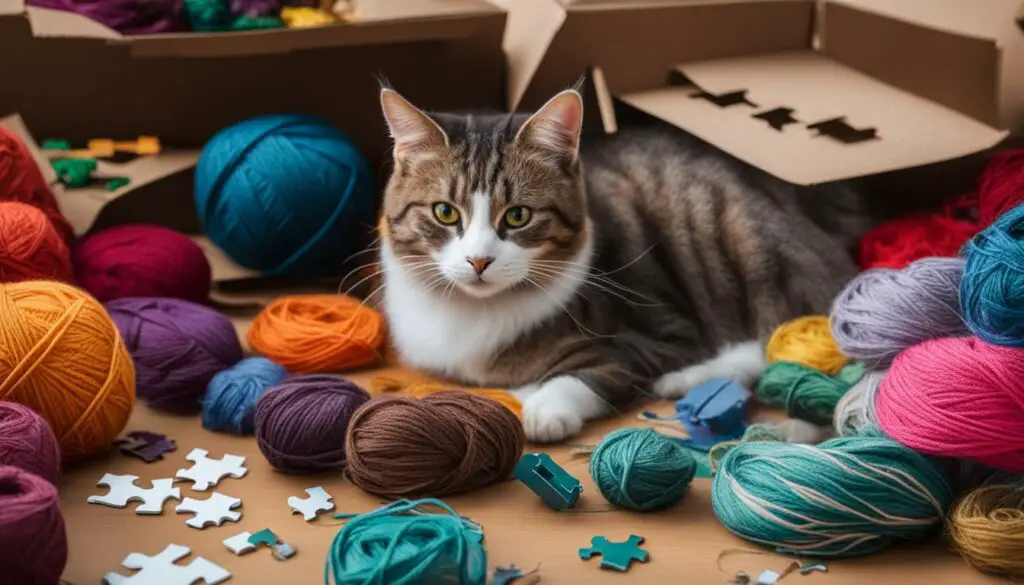
By focusing on mental and physical stimulation, you can help reduce your cat’s excessive meowing and create a happy and contented feline companion. Remember to observe your cat’s behavior and adjust their stimulation needs accordingly. Providing regular playtime, interactive toys, and an enriching environment will not only keep your cat entertained but also contribute to their overall well-being.
Observing and Addressing Changes
As a cat owner, it’s important to be observant of any changes in your feline companion’s behavior, as they may be indicating underlying issues that are causing excessive meowing. Cats are creatures of habit, and even small changes in their environment or routine can cause stress and anxiety, leading to increased vocalizations. By paying close attention to their behavior, you can identify potential triggers and take steps to address them.
One common change that can trigger excessive meowing is moving to a new home. Cats are territorial animals, and the unfamiliar surroundings of a new home can be overwhelming for them. To help ease their transition, provide a safe and comforting space for them to retreat to, and gradually introduce them to different areas of the house. Maintaining a consistent routine can also help them feel more secure and reduce their meowing.
Loss of a family member, whether human or another pet, can also cause significant emotional distress in cats. They may vocalize more to express their grief or seek comfort from their remaining family members. During such times, it’s important to provide extra support and attention to help them cope with their loss.
Changes in routine and daily life events
Changes in routine and daily life events can also impact a cat’s behavior and trigger excessive meowing. For example, if there have been significant changes in their feeding schedule or the way you interact with them, they may express their confusion or frustration through increased vocalizations. Maintaining a consistent routine and gradually introducing any changes can help reduce their meowing and provide them with a sense of stability.
Additionally, environmental changes such as loud noises, new furniture, or the presence of unfamiliar visitors can cause stress in cats and lead to excessive meowing. Creating a calm and safe environment for your cat, free from potential stress triggers, can help alleviate their anxiety and reduce their vocalizations.
By observing and addressing changes in your cat’s behavior and environment, you can better understand the underlying reasons for their excessive meowing. Whether it’s a recent move, loss of a family member, or other major life events, providing extra support, comfort, and a consistent routine can help reduce their stress and anxiety, ultimately reducing their meowing.
Medical Check-ups and Seeking Veterinary Advice
Regular medical check-ups are vital for ensuring the overall health and well-being of your cat. If you notice excessive meowing that persists or if it’s accompanied by other concerning symptoms, it’s recommended to seek veterinary advice. A veterinarian can conduct a thorough examination to determine if there are any underlying medical issues contributing to the behavior. By addressing these health concerns, appropriate treatment can be provided, offering relief to your cat.
During a medical check-up, the veterinarian will assess your cat’s physical condition, including their weight, body temperature, and overall appearance. They may also perform diagnostic tests, such as blood work or imaging, to further evaluate your cat’s health. These tests can help identify any underlying medical conditions, such as urinary tract infections or gastrointestinal issues, which may be causing discomfort and contributing to excessive meowing. Additionally, the veterinarian can provide guidance on preventive care measures, such as vaccinations and parasite control, to keep your cat healthy.
While seeking veterinary advice, it’s important to communicate any changes or unusual behavior you’ve observed in your cat. This information can help the veterinarian gain a better understanding of your cat’s overall health and assist in making an accurate diagnosis. They may also inquire about your cat’s diet, exercise routine, and living environment to identify any potential triggers for excessive meowing. By working closely with a veterinarian, you can ensure that your cat receives the appropriate care and support they need.
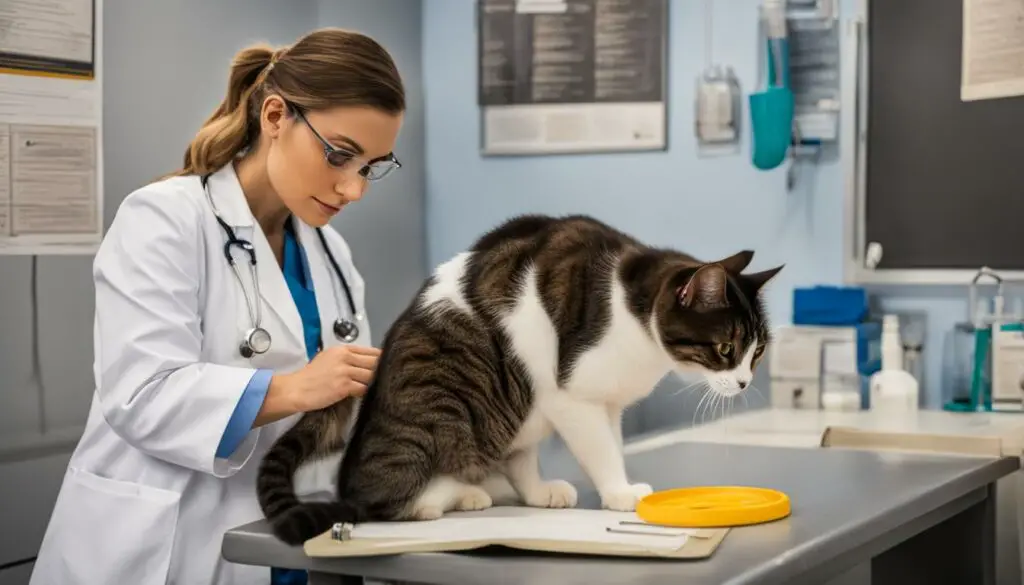
Benefits of Regular Check-ups:
- Early detection of health issues
- Preventive care to maintain your cat’s well-being
- Individualized guidance for nutrition and exercise
- Opportunity to address behavioral concerns
- Establishing a long-term relationship with your veterinarian
“Regular check-ups and seeking veterinary advice are essential for keeping your cat healthy and addressing any excessive meowing. By being proactive in your cat’s healthcare, you can ensure their overall well-being and provide them with the attention and care they deserve.”
Conclusion
After adopting a cat, dealing with excessive meowing can be challenging, but it’s important to understand the reasons behind this behavior. Cats use vocalizations to communicate, and meowing is their way of expressing their needs and desires. Whether it’s hunger, thirst, anxiety, or seeking attention, addressing the underlying cause is crucial in helping your new furry friend calm down.
Providing a supportive and enriching environment for your cat is key. Spend quality time with them, offering affection and reassurance. Additionally, ensure that their basic needs, such as food, water, and mental/physical stimulation, are met. By observing their behavior and addressing any changes or possible medical issues, you can help alleviate excessive meowing.
If you’re concerned about your cat’s meowing, it’s always a good idea to consult with a veterinarian. Regular check-ups are important for their overall well-being and can help identify any underlying health problems contributing to the behavior. With patience and attention, you can create a harmonious and meow-free environment for you and your newly adopted cat.
FAQ
Why do cats meow?
Cats meow to communicate with humans and other cats. They use vocalizations to express needs like hunger, attention, or the desire to breed.
What are the reasons behind excessive meowing in cats?
Excessive meowing can be caused by hunger, thirst, fear, anxiety, stress, separation from mother or littermates, seeking attention or comfort, medical issues, playtime behavior, adjustment to a new home, environmental factors, cognitive issues, or reproductive behaviors.
Why do kittens meow excessively?
Kittens may meow excessively when separated from their mother and littermates, as they feel distressed and long for their mother’s presence and comfort.
How can I help my cat if it is seeking attention or comfort through meowing?
Spending quality time with your cat and providing affection can help reduce their excessive meowing. Ignoring their meows during inappropriate times can discourage the behavior.
What can medical issues contribute to excessive meowing in cats?
Cats may meow more than usual if they are in pain, injured, or feeling unwell. Monitoring their behavior and seeking veterinary attention when needed is important.
What role does playtime play in reducing excessive meowing?
Engaging in regular play sessions with interactive toys and providing mental and physical stimulation can help channel your cat’s energy and reduce excessive meowing.
How can I help my cat adjust to a new home and reduce excessive meowing?
Giving your cat time to acclimate and providing a calm and reassuring environment can help ease their transition and reduce meowing. Gradual introductions and maintaining a consistent routine also help.
What environmental factors can contribute to excessive meowing in cats?
Changes in the environment such as loud noises or unfamiliar visitors can cause stress in cats and contribute to excessive meowing. Creating a safe and comfortable space for your cat can help alleviate the behavior.
How can cognitive issues lead to excessive meowing in cats?
Cats with cognitive issues may meow out of boredom, confusion, or habit. Consulting a veterinarian is important to diagnose and address these issues.
How can spaying or neutering help reduce excessive meowing in cats?
Unspayed female cats meow excessively when in heat to attract mates, and unneutered male cats may meow when detecting the scent of a female cat in heat. Spaying or neutering your cat can reduce these reproductive-related behaviors and meowing.
How can I avoid reinforcing excessive meowing in my cat?
Ignoring constant meowing, especially during inappropriate times, can discourage the behavior. Providing attention and rewards when your cat is quiet reinforces desired behaviors.
How important is mental and physical stimulation in reducing excessive meowing?
Cats need mental and physical stimulation to prevent boredom and reduce excessive meowing. Interactive toys, scratching posts, and playtime can provide an outlet for their energy.
What should I observe and address to reduce excessive meowing in my cat?
Being observant of changes in your cat’s behavior and environment can help identify triggers of excessive meowing. Addressing changes, providing support, and maintaining a consistent routine can help reduce the behavior.
Why are regular medical check-ups and veterinary advice important for cats with excessive meowing?
Regular check-ups are important to ensure your cat’s overall health. If excessive meowing persists or is accompanied by other concerning symptoms, seeking veterinary advice is recommended to address any underlying medical issues.
What can I do to help my cat feel more comfortable and reduce excessive meowing?
Understanding the reasons behind your cat’s meowing, addressing their needs, and providing a supportive and enriching environment can help reduce excessive meowing and make your cat feel more comfortable.
Source Links
- https://www.maddiesfund.org/excessive-meowing.htm
- https://catanddoghouse.com/just-adopted-cat-wont-stop-meowing/
- https://www.hepper.com/i-just-adopted-a-cat-and-it-wont-stop-meowing/

